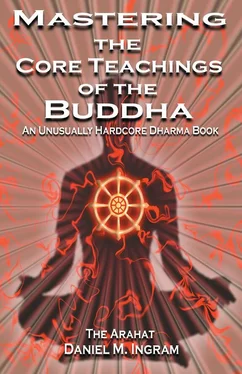Daniel Ingram - Mastering the Core Teachings of Buddha - An Unusually Hardcore Dharma Book
Здесь есть возможность читать онлайн «Daniel Ingram - Mastering the Core Teachings of Buddha - An Unusually Hardcore Dharma Book» весь текст электронной книги совершенно бесплатно (целиком полную версию без сокращений). В некоторых случаях можно слушать аудио, скачать через торрент в формате fb2 и присутствует краткое содержание. Год выпуска: 2009, ISBN: 2009, Издательство: Aeon Books, Жанр: Старинная литература, на русском языке. Описание произведения, (предисловие) а так же отзывы посетителей доступны на портале библиотеки ЛибКат.
- Название:Mastering the Core Teachings of Buddha - An Unusually Hardcore Dharma Book
- Автор:
- Издательство:Aeon Books
- Жанр:
- Год:2009
- ISBN:9781904658405
- Рейтинг книги:5 / 5. Голосов: 1
-
Избранное:Добавить в избранное
- Отзывы:
-
Ваша оценка:
- 100
- 1
- 2
- 3
- 4
- 5
Mastering the Core Teachings of Buddha - An Unusually Hardcore Dharma Book: краткое содержание, описание и аннотация
Предлагаем к чтению аннотацию, описание, краткое содержание или предисловие (зависит от того, что написал сам автор книги «Mastering the Core Teachings of Buddha - An Unusually Hardcore Dharma Book»). Если вы не нашли необходимую информацию о книге — напишите в комментариях, мы постараемся отыскать её.
Mastering the Core Teachings of Buddha - An Unusually Hardcore Dharma Book — читать онлайн бесплатно полную книгу (весь текст) целиком
Ниже представлен текст книги, разбитый по страницам. Система сохранения места последней прочитанной страницы, позволяет с удобством читать онлайн бесплатно книгу «Mastering the Core Teachings of Buddha - An Unusually Hardcore Dharma Book», без необходимости каждый раз заново искать на чём Вы остановились. Поставьте закладку, и сможете в любой момент перейти на страницу, на которой закончили чтение.
Интервал:
Закладка:
Transactional Analysis (Vann Joines’ TA Today) than I did from over a decade of highly successful Buddhist meditation. That doesn’t mean that I have achieved perfect psychological health, not by a long shot!
Focusing on psychological growth is an epidemic disease in Western insight practice. Many of the major retreat centers that purport to foster insight practice in the US and Europe are actually bastions of the worst pop psychological bullshit retrofitted with a bastardized Buddhist front.
You have only to go to a few small group meetings on retreats, as I mentioned in Part II, to hear that the vast majority of people who are supposed to be doing insight practices are actually just wallowing in their own neurotic crap. Sure, they may be highly intelligent, super sophisticated, fantastically well-rationalized, pseudo-Buddhist practitioners of the Great Sacred Neurotic Crap Wallow, but they are wallowing just the same.
As I mentioned before, that this sort of behavior is tolerated on meditation retreats at all is mind-boggling, but that it gets reinforced and rewarded as often as it does is a crying shame that reflects as badly on the teachers as it does the practitioners. I have had insight teacher after insight teacher try to focus on what I was feeling and how my relationships were going when all I wanted to do was talk about my attempts at insight practices, as I assumed, often wrongly, that they were insight teachers.
While the dharma is vast, and the teachings of the wisdom traditions contain a lot of material for helping grow psychologically, that doesn’t mean that it has anything to do with awakening or insight practice at all, 294
Models of the Stages of Enlightenment and letting people get stuck there does them little service, if you ask me, which you clearly did, as you are reading this book. Again, as I said before, working on one’s psychological stuff can have its value, but I firmly believe that keeping the line between insight practice and psychological work drawn as firmly as possible is essential to doing either well.
Further, it is oh so easy to imagine that the teachers on the front cushion couldn’t possibly be as neurotic as we are, and before you know it we have the breeding ground for massive shadow sides, exploitation, isolation, and scandal just like we had with the models that purport emotional perfection. The Jet Set culture of teachers popping in, getting up on the front cushion, spouting their beautiful ideals, and jetting off to somewhere else before anyone can see them as the humans they really are only goes to reinforce these dangerous notions. It is just so easy to project all kinds of wondrous qualities on to them when the dream is so nicely laid out and the opportunities for reality testing so few. Clearly, that suits most of them just fine, or they would go more out of their way to counter those notions, but, as they quickly learn, countering those notions just doesn’t sell, and getting caught up in that sort of transference feels mighty friggin’ nice.
Thus, I think that the models that reinforce the notion that psychological perfection or freedom from our psychological stuff will come simply by seeing through the sense of a separate, permanent agent are a serious problem for these major reasons:
1) They simply aren’t true.
2) They cause practitioners to get caught up in their stuff rather than focusing on the Three Characteristics or something equivalent, thus squandering the vast majority of Western Buddhist practitioner’s scant retreat and practice time.
3) They allow teachers to be able to ride the hot air of these preposterous ideals to dangerous heights.
4) They contribute to the erroneous sense of the gap between this ordinary, human existence and awakening by creating unrealistic ideals and goals.
Most Buddhist practitioners that I know have something like one of the following belief structures:
295
Models of the Stages of Enlightenment
1) That awakening is impossible, so the best thing to try for is psychological or emotional health or perfection.
2) That awakening is psychological or emotional perfection, so by trying for psychological or emotional perfection one is doing the practices that lead to awakening.
3) That awakening involves psychological or emotional perfection, so it clearly is impossible, and by sitting they are trying to accomplish something else, but if you ask them what that is they are usually unable to answer clearly.
What is so ironic is that awakening is hard but clearly not
impossible, and not nearly as impossible as achieving psychological or emotional perfection. In fact, seeing sensations clearly enough to see that they are all just happening and coming and going is extremely straightforward once you finally realize that is what you are supposed to be doing. Further, when I think back on all the things I have done, including going to medical school, spending a year in India working as a volunteer there, and finishing a medical residency, I must say that the work I went through to get those things was significantly more than the work it took to get to stream entry and even arahatship. It is not that getting stream entry was easy, just not as hard as plenty of other things I have done. I attribute my success to a vast array of factors, but two that are relevant here are a tolerance for pain and having a good working model. That model was one that was blissfully free of the notion of emotional or psychological perfection.
When I think about what it would take to achieve freedom from all psychological stuff, the response that comes is this: life is about stuff.
Stuff is part of being alive. There is no way out of this while you are still living. There will be confusion, pain, miscommunication,
misinterpretation, maladaptive patterns of behavior, unhelpful emotional reactions, weird personality traits, neurosis and possibly much worse. There will be power plays, twisted psychological games, people with major personality disorders (which may include you), and craziness. The injuries continue right along with the healing and eventually the injuries win and we die. This is a fundamental teaching of the Buddha. I wish the whole Western Buddhist World would just get over this notion that these practices are all about getting to our Happy 296
Models of the Stages of Enlightenment Place where nothing can ever hurt us or make us neurotic and move on to actually mastering real Buddhist practice rather than chasing some ideal that will never appear.
All that said, there is some debate about what factors or progress allows some people to just notice the Three Characteristics of the sensations that make up their world in the fact of their stuff as opposed to those who just flounder in their stuff. Some would argue that you have to have done enough psychological work and deal with enough of your issues to get to the place were you can move on to the next stage. I must reluctantly admit that there is probably some truth to this.
However, I didn’t consider myself particularly psychologically advanced when I started insight practices, as I had all kinds of stuff to deal with and still do, and yet somehow, perhaps through good instruction, perhaps through some other factors I have yet to identify, I was able to practice well despite it all and make the shift from being lost in content to noticing how things actually are.
THE THOUGHT MODELS
Speaking screwed up models, we have the Thought Models. These are models that tend to focus on something different happening with thoughts in those who are awakened, rather than simply seeing through the thought patterns that create a sense of a center point or special, permanent, separate self. These idealized models include not thinking certain thoughts, such as enlightened beings being unable to think the thought “I” or “I am”, not thinking at all and thus stopping the process of thought, or some other modification to thoughts, such always thinking good thoughts, whatever those are.
Читать дальшеИнтервал:
Закладка:
Похожие книги на «Mastering the Core Teachings of Buddha - An Unusually Hardcore Dharma Book»
Представляем Вашему вниманию похожие книги на «Mastering the Core Teachings of Buddha - An Unusually Hardcore Dharma Book» списком для выбора. Мы отобрали схожую по названию и смыслу литературу в надежде предоставить читателям больше вариантов отыскать новые, интересные, ещё непрочитанные произведения.
Обсуждение, отзывы о книге «Mastering the Core Teachings of Buddha - An Unusually Hardcore Dharma Book» и просто собственные мнения читателей. Оставьте ваши комментарии, напишите, что Вы думаете о произведении, его смысле или главных героях. Укажите что конкретно понравилось, а что нет, и почему Вы так считаете.












